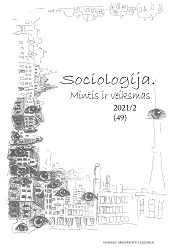Experiences of Female Political Activists from Eastern and Central Europe in Berlin: An Intersectional Analysis
Experiences of Female Political Activists from Eastern and Central Europe in Berlin: An Intersectional Analysis
Author(s): Alisa SheppentalSubject(s): Gender Studies, Civil Society, Comparative politics, Sociology of Politics, Politics and Identity
Published by: Vilniaus Universiteto Leidykla
Keywords: intersectionality; political activism; gender; citizenship;
Summary/Abstract: The following article analyzes the experiences of female political activists from Eastern and Central Europe in Berlin. Semi-structured interviews with women (aged 20–35) were conducted and analyzed using the intersectional approach originally proposed by N. Degele and G. Winker. Intersectionality is described as a system of interactions between inequality-creating social structures (power relations), symbolic representations, and identity constructions. All the women who participated in this study describe activism as an important aspect of their identities. For non-German citizens, the activist identity is closely related to the migrant identity and is one of the major reasons they decided to move to Germany. Negative experiences in a country of origin were contrasted with a tolerant activist environment in Berlin. However, German citizens with no negative experiences in their countries of origin also implied a contrast between the “less tolerant East” and “more tolerant West”. The distinction was constructed either as a symbolical representation or articulation of experience of intergenerational conflict.
Journal: Sociologija. Mintis ir Veiksmas
- Issue Year: 2021
- Issue No: 49 (02)
- Page Range: 50-69
- Page Count: 20
- Language: English

